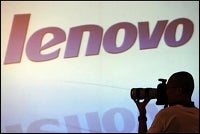 |
| Source: Reuters |
Lenovo Group, the world’s fourth-largest PC maker, posted a 65 percent rise in quarterly earnings, the slowest growth in a year, as it copes with a U.S. slowdown and weaker Chinese demand after a devastating earthquake.
China’s largest maker of personal computers posted a net profit of $110.49 million from April to June, up from $66.84 million a year ago, and just ahead of the average forecast of $107.47 million from four analysts polled by Reuters.
Shares in Lenovo fell 2.6 percent on Thursday ahead of the results announcement, lagging a 0.7 percent rise in the benchmark Hang Seng Index.
Lenovo’s falling margins in the face of keen competition has concerned analysts, but they say Lenovo, which competes with Hewlett-Packard, Dell Inc and Asian rival Acer, should fare better over the long run because of its commanding market share in China and in emerging markets.
Operating profit margin in China — it commands a third of the world’s top PC market after the United States — fell to 6.8 percent in April-June period from 7.3 percent a year earlier. Its operating profit margin in the Americas fell dramatically to 0.3 percent from 3.4 percent.
Deepak Advani, Lenovo’s chief marketing officer, told Reuters that it was difficult to judge the economic landscape in the U.S., but that Lenovo would continue to invest in R&D.
“The drop was largely due to due to increased competition and promotional activities for the Olympic Games. We expect the margin to remain stable at this level in the current year,” CFO Wong Wai Ming told reporters.
Lenovo held 7.9 percent of the worldwide PC market in the quarter, down slightly from 8 percent a year earlier, according to IT consultants IDC, the first time in six quarters that it lost market share on a year-on-year basis.
Olympic impact
Analysts said PC demand could slow during the Olympics as people’s attention turns to the games.
“The Olympics will have some negative impact on the PC sales, not necessarily less than the earthquake, since it will last a few weeks and will affect main cities such as Beijing,” said JPMorgan analyst Charles Guo.
Armed with a strong balance sheet, Lenovo has said it will explore acquisitions after Acer beat it in a race to buy Europe’s Packard Bell last year.
Lenovo bought IBM’s PC arm in 2005 for $1.25 billion, an early sign of Chinese companies’ ambitions to expand globally.
It has spent $96 million to buy back 148 million shares since March.
Lenovo plans to spend more effort and invest more resources in the development of its emerging markets and consumer business, potential growth engines over the next few years, Chairman Yang Yuanqing said.
Late to the party, Lenovo only this year re-launched a consumer PC business with new products in Europe and the United States. On Tuesday, it said it would launch its first ultra-low cost laptop or “netbook”, about a year after rivals had.
“Even if the margin on the netbook is very low, Lenovo must do it, otherwise it will lose market share,” said JPMorgan’s Guo.
Shares in Lenovo rose 5.5 percent in April-June, outpacing a fall of just over 3 percent in the Hang Seng Index.
The stock still trades at 13.8 times prospective earnings, versus Dell’s 15.9 and HP’s 12.6, according to Reuters Estimates.


